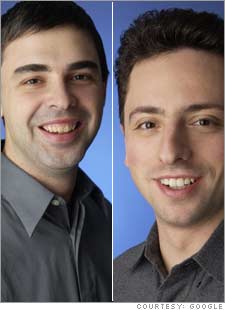 Rank: 2
Rank: 2Sergey Brin & Larry Page
Co-founders, Google
Why They Matter: Success hasn't really changed the Google guys all that much: They're still Stanford computer geeks to the core. That's why the company has become a magnet for like-minded geniuses -- witness the Silicon Valley billboards with brain-teasing number puzzles that turn out to be Google recruitment ads. It's also why their PageRank algorithm remains the best mousetrap in search, why their groundbreaking pay-per-click advertising model brought in a stunning $6 billion in revenue last year, why Google's market cap hovers comfortably above $100 billion, and why their ongoing project to organize all of the world's information is taken seriously. What Page's famous list of his 100 most interesting projects lacked in focus, it more than made up for in ambition. The same is true of Brin's long-term strategy -- organizing all that information into a database that will act as a kind of global brain for all human knowledge. Technically, the pair run the world's top technology company as a triumvirate with CEO (and resident adult) Eric Schmidt. But what the geeks want, they usually get. After all, there are plenty of CEO types who could replace Schmidt. But who on earth could possibly replace Sergey and Larry?
 Rank: 3
Rank: 3Paul Jacobs
CEO, Qualcomm
Why He Matters: When Jacobs took the reins at Qualcomm in July 2005, cries of nepotism reverberated through the telecom industry. After all, his father, Irwin Jacobs, built Qualcomm into the world's most powerful wireless infrastructure company. But fast-forward one year -- when the company's second-quarter revenue was up 34 percent from 2005 -- and investors are describing Paul as a chip off the old block. It's not beginner's luck: After joining the family business in 1990, the younger Jacobs was key to the success of CDMA, which has become the leading standard for 3G phones and the company's top moneymaker. He also had a hand in the Brew system, an applications development tool used by 69 mobile operators in 34 countries. Next up, Jacobs is leading Qualcomm into the new frontier by providing the tools carriers need to offer streaming video to cell phones. So what if favoritism helped him get ahead? He's got the stuff to ensure that Qualcomm will remain both the Microsoft and the Intel of the booming wireless industry.
 Rank: 4
Rank: 4Rupert Murdoch
CEO, News Corp.
Why He Matters: He's already the planet's most prominent media mogul, with properties that span Europe (BSkyB satellite service and England's Times and Sun newspapers), Asia (the Foxtel and StarTV satellite networks), and North America (Fox Studios in Hollywood, Fox News, DirecTV, and the New York Post). But at 75, Murdoch is still trying to extend his reach, and this time he has America's youth audience in his crosshairs -- and a host of new Web properties in his portfolio. His big splash, of course, was the $580 million purchase of the wildly popular MySpace social-networking portal last summer. That was followed by News Corp.'s $650 million acquisition of the Internet gaming and entertainment company IGN. The goal is to develop a network of sites that will enable advertisers to reach Web-savvy 18- to 34-year-olds -- a demographic that increasingly shuns traditional mass media like newspapers and television. (See "Sly Fox?," page 100.) Big media companies have fared poorly in their attempts to reach Generation Net, but Murdoch's flair for bombastic populism may offer a decisive advantage. Or, as the kids might say, "Not bad ... for an old guy."
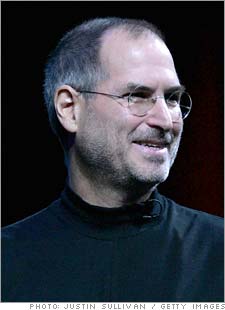 Rank: 5
Rank: 5Steve Jobs
CEO, Apple Computer
Why He Matters: Easily the greatest marketer since P.T. Barnum, Jobs has also become the innovator's muse. Is there anyone in American business today whose style, creativity, and pugnacious genius are more celebrated? Which brings us back to the question that drives this list: What's he done for us lately? Yes, yes, iPods, iTunes, creating a whole industry -- we already take that for granted. And the heretical move to the dual-core, Windows-running Intel chip. Fine, sweet, very cool -- and long overdue. But let's separate the reality from the distortion field: 2005 was a record year ... for Wintel PCs! An astounding 203 million Windows-running machines were shipped last year, and Windows market share has held steady at 94 percent since 1996. During the same decade, Mac's share slipped from 5.2 percent to 2.3 percent. Of course, Apple's influence has always far exceeded its modest scale, so all we're saying is ... bring on the next big innovation. Mobile phones? Home media centers? iHovercrafts? Take your pick, but we're ready for more.
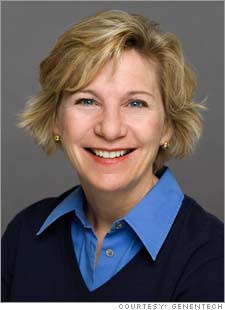 Rank: 6
Rank: 6Susan Desmond-Hellmann
President of product development, Genentech
Why She Matters: While other drug companies chase the balding and the erectile-challenged, Desmond-Hellmann keeps biotech pioneer Genentech focused on creating drugs that make the difference between life and death. She spent years battling AIDS in Uganda and cancer in Kentucky as both a physician and a medical researcher, and those experiences have done much to shape Genentech's current priorities. Thus far, she's overseen the clinical trials and approvals of such successes as Avastin (colon cancer) and Tarceva (lung cancer). She's also shepherding in a new era of patient-targeted treatments with Herceptin (a breast cancer treatment that works best on women who carry a specific pattern of genes) and ensuring that Genentech's pipeline includes promising treatments for ovarian cancer and basal skin cancer. Genentech is already hailed as a pioneer, but if Desmond-Hellmann can turn cancer into a manageable disease, she may well earn a place in the history books alongside the likes of Jonas Salk.
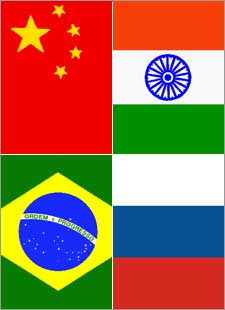 Rank: 7
Rank: 7The Emerging Global Middle Class
China, India, Russia, Brazil, and elsewhere
Why They Matters: According to Goldman Sachs, in the next decade, more than 800 million people in China, India, Russia, and Brazil will qualify as middle class -- meaning they will earn more than $3,000 per year. To put the figure in context, that's more than the combined population of the United States, Western Europe, and Japan. These ambitious, well-educated workers represent both a threat and an opportunity for corporate America. On the one hand, thanks to global competition, they're bringing brutal cost pressure to bear on U.S. products. Yet at the same time, these newly affluent consumers have money to spend -- more than $1 trillion a year, according to most estimates -- and they generally aspire to own American brands and other high-quality imports. They're looking forward to enjoying a more comfortable way of life, and huge opportunities await the global firms that figure out how to deliver that at a price these workers can afford.
 Rank: 8
Rank: 8Fujio Cho
Chairman, Toyota
Why He Matters: High oil prices? Toyota says, Bring it on. In May, as the average cost of a gallon of gas approached $3, Toyota reported a 17 percent sales increase over the year before, even as General Motors and Ford saw declines of 16 and 2 percent, respectively. Building on the continuing popularity of its fuel-sipping Prius, Toyota now offers hybrid gas-electric power in its Camry (the best-selling car model in the United States) and its Highlander SUV. Sales of the company's gasoline-powered small cars have been strong as well. Cho helped make Toyota what it is today: the world's most profitable carmaker and an unrivaled leader when it comes to producing the innovative, high-quality cars that buyers covet worldwide. He led Toyota's effort to open its own U.S. factories in the 1980s and later went on to engineer the company's push into the emerging markets of Eastern Europe and China. And while he isn't the boss of the world's biggest automaker yet -- Toyota won't snatch the global vehicle-output crown from GM until later this year or next -- he already leads the company that other automakers watch with a mixture of awe and envy.
 Rank: 9
Rank: 9The New Oil Despots
King Abdullah bin Abdul aziz al Saud (Saudi Arabia), Mahmoud Ahmadinejad (Iran), Hugo Chavez (Venezuela), and Vladimir Putin (Russia)
Why They Matters: They're a slippery cast of characters, and sadly, their influence is growing. America's petroleum addiction has left the U.S. economy at the mercy of a new generation of international strongmen, and among them, they control nearly half of the world's petroleum reserves. Worse, they're becoming more brazen and influential as the high price of oil adds billions to their national treasuries. They've got the U.S. economy over the barrel, and innovation industries aren't immune to their mischief. Inflation? Regional instability? Both threaten economic growth and the capital flows that are the lifeblood of entrepreneurship. But there's a silver lining: Those high oil prices also create new opportunities for alternative energy technologies.
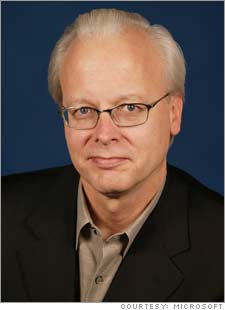 Rank: 10
Rank: 10Ray Ozzie
Chief technical officer, Microsoft
Why He Matters: Ozzie may be the new guy at Microsoft, but he's quickly learned how things are done in Redmond: Find the best ideas in the marketplace, copy them unabashedly, then repackage the finished product as the company's latest and greatest innovation. Though Bill Gates is still chairman and Steve Ballmer is still CEO, Ozzie has become the driving force behind Microsoft's effort to become nimbler in response to mounting competition from the likes of Google, Salesforce, open-source software, and dozens of Web 2.0 startups. The solution, he says, lies beyond cumbersome shrink-wrapped PC software (such as the tardy Windows Vista operating system). Salvation will come through online services that can be quickly improved, modified, and distributed via the Web. Some components of this effort, branded Windows Live, are already out in beta, including a security tool and an e-mail application. Gates has given Ozzie's derivative "vision" his full blessing, so the coming years will be key: If Ozzie succeeds, Microsoft may once again become a growth company.
Reference by: Business 2.0 CNN Money
No comments:
Post a Comment